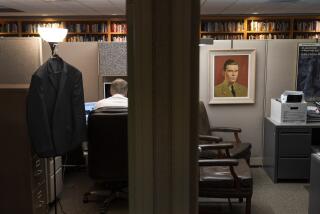Grown older, yet more current
NEW YORK — For decades, the lips of William F. Buckley, the maestro of “Firing Line” and other conservative affairs, would famously curl as he regarded the perceived follies of his liberal opponents.
But on a recent afternoon, the smile is only sweet as he considers any follies of his own, the bumps sustained on what Buckley, a confirmed man of the sea, might call the long voyage of life.
Personal letdowns? No. He has countless friends, loved his parents, has been married for more than 50 years and adores his son, author and humorist Christopher Buckley. Professional setbacks? The Soviet Union is dead, Ronald Reagan an iconic politician and the conservative movement, a movement he helped rejuvenate a half-century ago, stronger than ever.
“There’s no weltschmerz, or any sadness that permeates my vision,” he says at his Park Avenue duplex. “There isn’t anything I reasonably hoped for that wasn’t achieved.”
Now 78, Buckley has been executing one of the lengthier public withdrawals in recent memory, resigning in 1990 as editor of National Review, subsequently giving up both public speaking and “Firing Line” and, most recently, announcing he would sell off his controlling shares of the Review, the seminal conservative magazine he founded in the 1950s.
But even in supposed leisure, he is mindful of the time, tapping his watch to remind a reporter that he has a schedule to keep. He still writes a syndicated column, plans another spy novel -- featuring his recurring alter ego, the dashing Blackford Oakes -- and is promoting “Miles Gone By,” a collection of writings over the past half-century that serves as an informal memoir.
“What I have attempted is in the nature of a narrative survey of my life, at work and at play,” he writes in the introduction to the book, which covers everything from childhood to sailing to politics to mortality.
The weather outside is bright and hot, but in the sitting room of Buckley’s apartment the climate is cool and the color scheme as red as a sunburned communist: drapes, walls and bookshelves; sofa, carpet and chairs; all a velvety crimson, a palette Buckley assigns to the taste of his wife, Patricia.
In a gray sports coat, white khakis and matching shoes, the wavy-haired Buckley has an amiable, even casual presence, with his tie askew and shirt unbuttoned at the top. His face is jowled but still handsome. The voice, so familiar to fans of “Firing Line,” is haughty and composed but warmed by a certain affection, a sense of play and camaraderie amid the most serious debate.
Left and right spend a great deal of time insulting each other these days, but Buckley’s standing as a “civilized” conservative has allowed him to maintain at least cordial relationships with many on the other side. Walter Cronkite contributes an introduction to an audio disk that accompanies Buckley’s new book. Other friends, or warm acquaintances, have included economist John Kenneth Galbraith and columnists Murray Kempton and Nat Hentoff, who recalled appearing on “Firing Line.”
“Of all those kinds of programs, I thought his was one of the best,” says Hentoff, a longtime columnist for the liberal Village Voice. “He really invited people he knew would disagree with him, and he was a very sharp and informed interviewer who didn’t use shouting instead of argument.”
Buckley can appear old-fashioned, but his mind-set has never seemed more contemporary. The communist dragon has been slain and government activism modified, if not eliminated. Ideas once unthinkable -- from eliminating the estate tax to forcing welfare recipients to work -- are now acts of Congress. Proposals such as privatizing Social Security, once thought suicidal for politicians, are now seriously debated.
“History would be different had he never lived and accomplished what he accomplished, which was to take the conservative movement and open it up to intellectual growth,” says liberal author and columnist Eric Alterman.
“I don’t think he’s any great shakes as a thinker ... but I respect him. He’s nothing like the current neo-conservatives, fighting a culture war. He’s much more open to nuance and to honest disagreement.”
Born Nov. 24, 1925, in New York City, William Frank Buckley Jr. is the sixth of 10 children of a multimillionaire with oil holdings in seven countries. The precocious young Buckley was only 8 when he wrote to the king of England, demanding payment of the British war debt.
Conservatives such as Reagan began as liberals and then turned to the right, but Buckley has been conservative since old enough to speak his mind. He grew up in the type of household where jaws stiffened at the mention of Franklin Roosevelt and the New Deal, and Buckley never rebelled -- not even in jest.
Although it perpetually lost money, National Review built its circulation from 16,000 in 1957 to 125,000 in 1964, when conservative Sen. Barry Goldwater was the Republican presidential nominee. Circulation now stands at about 155,000.
“When Bill Buckley set out in the 1950s to found an intellectual magazine, conservatism was barely a presence at all. To the extent that it was a political presence, it was a blocking faction in Congress,” conservative author and columnist George Will says.
“Before Buckley, conservatism had the face of Bob Taft, a distinguished American but not the sort of man who could get the campuses excited,” says Will, referring to the dour conservative Ohio senator.
“Bill could go to the campus with that arch manner of his. And he was exciting and young and conservative. And all of a sudden, conservatism was sexy.
“If the conservative apogee was Ronald Reagan,” Will says, “then you could say that there would have been no Reagan without Barry Goldwater, who helped set the stage for Reagan, and no Goldwater without National Review, which was the organizing house organ for Goldwater, and without Bill Buckley there is no National Review.
“Ergo, you can argue that Bill is the most consequential journalist of his time and National Review the most consequential publication.”
More to Read
Sign up for our Book Club newsletter
Get the latest news, events and more from the Los Angeles Times Book Club, and help us get L.A. reading and talking.
You may occasionally receive promotional content from the Los Angeles Times.







